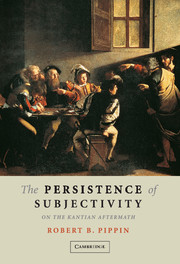Book contents
- Frontmatter
- Contents
- Acknowledgments
- The Persistence of Subjectivity
- 1 Introduction: “Bourgeois Philosophy” and the Problem of the Subject
- PART I SETTING
- PART II THEORISTS
- 3 Necessary Conditions for the Possibility of What Isn't: Heidegger on Failed Meaning
- 4 Gadamer's Hegel: Subjectivity and Reflection
- 5 Negative Ethics: Adorno on the Falseness of Bourgeois Life
- 6 The Unavailability of the Ordinary: Strauss on the Philosophical Fate of Modernity
- 7 Hannah Arendt and the Bourgeois Origins of Totalitarian Evil
- 8 On Not Being a Neo-Structuralist: Remarks on Manfred Frank and Romantic Subjectivity
- 9 Leaving Nature Behind, or Two Cheers for Subjectivism: On John McDowell
- Postscript: On McDowell's Response to “Leaving Nature Behind”
- PART III MODERN MORES
- PART IV EXPRESSION
- Bibliography
- Name Index
- Subject Index
8 - On Not Being a Neo-Structuralist: Remarks on Manfred Frank and Romantic Subjectivity
Published online by Cambridge University Press: 05 June 2012
- Frontmatter
- Contents
- Acknowledgments
- The Persistence of Subjectivity
- 1 Introduction: “Bourgeois Philosophy” and the Problem of the Subject
- PART I SETTING
- PART II THEORISTS
- 3 Necessary Conditions for the Possibility of What Isn't: Heidegger on Failed Meaning
- 4 Gadamer's Hegel: Subjectivity and Reflection
- 5 Negative Ethics: Adorno on the Falseness of Bourgeois Life
- 6 The Unavailability of the Ordinary: Strauss on the Philosophical Fate of Modernity
- 7 Hannah Arendt and the Bourgeois Origins of Totalitarian Evil
- 8 On Not Being a Neo-Structuralist: Remarks on Manfred Frank and Romantic Subjectivity
- 9 Leaving Nature Behind, or Two Cheers for Subjectivism: On John McDowell
- Postscript: On McDowell's Response to “Leaving Nature Behind”
- PART III MODERN MORES
- PART IV EXPRESSION
- Bibliography
- Name Index
- Subject Index
Summary
My theme in the following is Manfred Frank's interpretation of “postmetaphysical” European philosophy. I want to express some solidarity with his hesitations about the program he calls “neostructuralism” and also to raise several questions about the “counterneostructuralist” program that Frank has been defending in many works since the early 1980s, especially about the nature of his appeal to complexly linked themes in German romantic philosophy, preintentional theories of self-awareness, hermeneutics, and Sartrean existentialism. As my chapter title already implies, for Frank, not to be a neostructuralist is to have taken up some strong stand on the irreducibility and ineliminability of subjectivity, especially on the nature and importance of self-awareness and on the implications of such a possibility for any general theory of the intelligibility of anything. (Although the “problem of subjectivity” is a well-known formulation, I note that, in this context, I understand claims about “the priority and irreducibility of the subject” to be simply the name for the counterposition against “objectivism,” the position that holds that the knowing, perceiving, and acting subject must be understood as just another, however unique, object in the world, in the best way objects in the world are understood, by modern natural science.
- Type
- Chapter
- Information
- The Persistence of SubjectivityOn the Kantian Aftermath, pp. 168 - 185Publisher: Cambridge University PressPrint publication year: 2005
- 1
- Cited by

